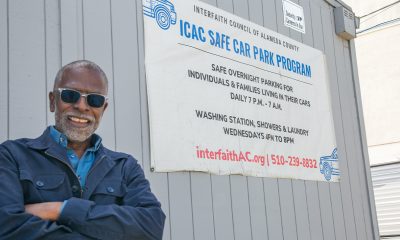Uncategorized
Homeless Find Refuge from Cold at Downtown Emergency Shelter
By Kevin Rychel, Oakland Local
Homeless people in Oakland had cause to worry when the Oakland Army Base’s Winter Shelter finally closed for good, especially in the wake of a recent Bay Area cold snap that claimed a number of homeless victims.
Questions arose about the ability of an emergency shelter to provide for those who would have sought refuge at the army base’s shelter. But even as the city experiences all time low temperatures, the city-designated emergency shelter may actually be an improved resource for struggling homeless people in Oakland.
That’s the hope, according to Jamie Almanza, executive director of the non-profit Bay Area Community Services (BACS), who says the move from the Army Base to the Henry Robinson Multi Service Center has thus far been “positive.”
According to Almanza, the Army Base shelter’s location required busing people from Oakland and Berkeley, which often proved difficult. The emergency shelter’s location on 16th Street in downtown Oakland will provide greater accessibility for those struggling through the cold weather.
The army base winter shelter had been a joint-shelter run by the cities of Oakland and Berkeley in an industrial area of West Oakland. Its 12-year existence came to an end in 2012, according to Susan Shelton, a manager at the City of Oakland Department of Housing services, and the base is now being developed in a major city project. T
The building that formerly housed the shelter is set to be demolished. The City of Berkeley has in turn responded to the closing of the Army Base by relocating funds to four of its local shelters.
Oakland’s emergency shelter at the Henry Robinson center has 50 beds for single men and women, half of what the joint shelter had (though the emergency shelter is not a joint venture as the Army Base was, and is directed towards Oakland residents).
According to Shelton, the Henry Robinson center was recommended by a task force appointed by Mayor Jean Quan and was chosen because of its “accessibility and proximity to mainstream services.” The city also allocated $168,161 to the emergency shelter.
But the transition of facilities to the Henry Robinson center was also due to its particular approach to the problem of homelessness itself, as it exists in Oakland. Jamie Almanza says BACS, which runs the emergency shelter, provides interim housing for the “chronically homeless” for a period of 4-18 months.
During this time the shelter also provides services to help its residents gain independent living skills and seek counseling and rehabilitation where it is needed. Some of the other services offered include helping the homeless gain driver’s licenses and health care.
The purpose of the interim housing, Almanza said, is to help the homeless secure permanent housing and ensure they can move into “stable, secure, and adequate housing” when they are prepared to leave the program.
Almanza also said the shelter prepared for the recent cold snap by partnering with St. Vincent de Paul, whose shelter absorbs the spillover when the Henry Robinson center is crowded beyond capacity. While the shelter has been adequately funded by the city, there is still a need for donations of men’s clothes, socks, towels, and other items, she said.
Cross Posting with Oakland Local.
Uncategorized
Oakland Housing and Community Development Department Awards $80.5 Million to Affordable Housing Developments
Special to The Post
The City of Oakland’s Housing and Community Development Department (Oakland HCD) announced its awardees for the 2024-2025 New Construction of Multifamily Affordable Housing Notice of Funding Availability (New Construction NOFA) today Five permanently affordable housing developments received awards out of 24 applications received by the Department, with award amounts ranging from $7 million to $28 million.
In a statement released on Jan. 16, Oakland’s HCD stated, “Five New Construction Multifamily Affordable Housing Development projects awarded a total of $80.5 million to develop 583 affordable rental homes throughout Oakland. Awardees will leverage the City’s investments to apply for funding from the state and private entities.”
In December, the office of Rebecca Kaplan, interim District 2 City Councilmember, worked with HCD to allocate an additional $10 Million from Measure U to the funding pool. The legislation also readopted various capital improvement projects including street paving and upgrades to public facilities.
The following Oakland affordable housing developments have been awarded in the current round:
Mandela Station Affordable
- 238 Affordable Units including 60 dedicated for Homeless/Special Needs
- Award: $15 million + previously awarded $18 million
- Developer: Mandela Station LP (Pacific West Communities, Inc. and Strategic Urban Development Alliance, LLC)
- City Council District: 3
- Address: 1451 7th St.
Liberation Park Residences
- 118 Affordable Units including 30 dedicated for Homeless/Special Needs
- Award: $28 million
- Developer: Eden Housing and Black Cultural Zone
- City Council District: 6
- Address: 7101 Foothill Blvd.
34th & San Pablo
- 59 Affordable Units including 30 dedicated for Homeless/Special Needs
- Award: $7 million
- Developer: 34SP Development LP (EBALDC)
- City Council District: 3
- Address: 3419-3431 San Pablo Ave.
The Eliza
- 96 Affordable Units including 20 dedicated for Homeless/Special Needs
- Award: $20 million
- Developer: Mercy Housing California
- City Council District: 3
- Address: 2125 Telegraph Ave.
3135 San Pablo
- 72 Affordable Units including 36 dedicated for Homeless/Special Needs
- Award: $10.5 million
- Developer: SAHA and St. Mary’s Center
- City Council District: 3
- Address: 3515 San Pablo Ave.
The source of this story is the media reltations office of District 2 City Councilmember Rebecca Kaplan.
Activism
Oakland Housing and Community Development Department Awards $80.5 Million to Affordable Housing Developments
In a statement released on Jan. 16, Oakland’s HCD stated, “Five New Construction Multifamily Affordable Housing Development projects awarded a total of $80.5 million to develop 583 affordable rental homes throughout Oakland. Awardees will leverage the City’s investments to apply for funding from the state and private entities.”

Special to The Post
The City of Oakland’s Housing and Community Development Department (Oakland HCD) announced its awardees for the 2024-2025 New Construction of Multifamily Affordable Housing Notice of Funding Availability (New Construction NOFA) today Five permanently affordable housing developments received awards out of 24 applications received by the Department, with award amounts ranging from $7 million to $28 million.
In a statement released on Jan. 16, Oakland’s HCD stated, “Five New Construction Multifamily Affordable Housing Development projects awarded a total of $80.5 million to develop 583 affordable rental homes throughout Oakland. Awardees will leverage the City’s investments to apply for funding from the state and private entities.”
In December, the office of Rebecca Kaplan, interim District 2 City Councilmember, worked with HCD to allocate an additional $10 Million from Measure U to the funding pool. The legislation also readopted various capital improvement projects including street paving and upgrades to public facilities.
The following Oakland affordable housing developments have been awarded in the current round:
Mandela Station Affordable
- 238 Affordable Units including 60 dedicated for Homeless/Special Needs
- Award: $15 million + previously awarded $18 million
- Developer: Mandela Station LP (Pacific West Communities, Inc. and Strategic Urban Development Alliance, LLC)
- City Council District: 3
- Address: 1451 7th St.
Liberation Park Residences
- 118 Affordable Units including 30 dedicated for Homeless/Special Needs
- Award: $28 million
- Developer: Eden Housing and Black Cultural Zone
- City Council District: 6
- Address: 7101 Foothill Blvd.
34th & San Pablo
- 59 Affordable Units including 30 dedicated for Homeless/Special Needs
- Award: $7 million
- Developer: 34SP Development LP (EBALDC)
- City Council District: 3
- Address: 3419-3431 San Pablo Ave.
The Eliza
- 96 Affordable Units, including 20 dedicated for Homeless/Special Needs
- Award: $20 million
- Developer: Mercy Housing California
- City Council District: 3
- Address: 2125 Telegraph Ave.
3135 San Pablo
- 72 Affordable Units including 36 dedicated for Homeless/Special Needs
- Award: $10.5 million
- Developer: SAHA and St. Mary’s Center
- City Council District: 3
- Address: 3515 San Pablo Ave.
The source of this story is media reltations office of District 2 City Councilmember Rebecca Kaplan.
Alameda County
Oakland Acquisition Company’s Acquisition of County’s Interest in Coliseum Property on the Verge of Completion
The Board of Supervisors is committed to closing the deal expeditiously, and County staff have worked tirelessly to move the deal forward on mutually agreeable terms. The parties are down to the final details and, with the cooperation of OAC and Coliseum Way Partners, LLC, the Board will take a public vote at an upcoming meeting to seal this transaction.

Special to The Post
The County of Alameda announced this week that a deal allowing the Oakland Acquisition Company, LLC, (“OAC”) to acquire the County’s 50% undivided interest in the Oakland- Alameda County Coliseum complex is in the final stages of completion.
The Board of Supervisors is committed to closing the deal expeditiously, and County staff have worked tirelessly to move the deal forward on mutually agreeable terms. The parties are down to the final details and, with the cooperation of OAC and Coliseum Way Partners, LLC, the Board will take a public vote at an upcoming meeting to seal this transaction.
Oakland has already finalized a purchase and sale agreement with OAC for its interest in the property. OAC’s acquisition of the County’s property interest will achieve two longstanding goals of the County:
- The Oakland-Alameda Coliseum complex will finally be under the control of a sole owner with capacity to make unilateral decisions regarding the property; and
- The County will be out of the sports and entertainment business, free to focus and rededicate resources to its core safety net
In an October 2024 press release from the City of Oakland, the former Oakland mayor described the sale of its 50% interest in the property as an “historic achievement” stating that the transaction will “continue to pay dividends for generations to come.”
The Board of Supervisors is pleased to facilitate single-entity ownership of this property uniquely centered in a corridor of East Oakland that has amazing potential.
“The County is committed to bringing its negotiations with OAC to a close,” said Board President David Haubert.
-

 #NNPA BlackPress4 weeks ago
#NNPA BlackPress4 weeks agoLIHEAP Funds Released After Weeks of Delay as States and the District Rush to Protect Households from the Cold
-

 Alameda County4 weeks ago
Alameda County4 weeks agoSeth Curry Makes Impressive Debut with the Golden State Warriors
-

 #NNPA BlackPress4 weeks ago
#NNPA BlackPress4 weeks agoSeven Steps to Help Your Child Build Meaningful Connections
-

 #NNPA BlackPress4 weeks ago
#NNPA BlackPress4 weeks agoSeven Steps to Help Your Child Build Meaningful Connections
-

 #NNPA BlackPress4 weeks ago
#NNPA BlackPress4 weeks agoTrinidad and Tobago – Prime Minister Confirms U.S. Marines Working on Tobago Radar System
-

 #NNPA BlackPress4 weeks ago
#NNPA BlackPress4 weeks agoThanksgiving Celebrated Across the Tri-State
-

 #NNPA BlackPress4 weeks ago
#NNPA BlackPress4 weeks agoTeens Reject Today’s News as Trump Intensifies His Assault on the Press
-

 #NNPA BlackPress4 weeks ago
#NNPA BlackPress4 weeks agoBreaking the Silence: Black Veterans Speak Out on PTSD and the Path to Recovery






















































